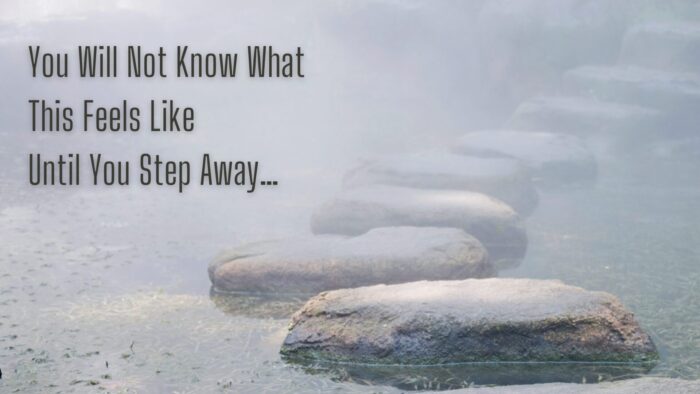You Will Not Know What This Feels Like Until You Step Away…
Donna Hoffmeyer
I almost didn’t write this week. I had a rough week, only to have it end with a weekend migraine. But, amid the chaos, I had another little “ah-ha” moment I thought I’d share with you.
As I said, this past week was a bit tough. I had a lot of meetings, a few WTF am I doing moments regarding my business, and took care of a sick kiddo. By Friday I was wiped.
Here’s the thought that made me go hmmmmm… comparing my previous job to my current status as an entrepreneur…a single day in the military was 10x more stressful than an entire week in the civilian world, but I feel the stress more now.
Why?
This is my theory. In the military, I embodied the stress. I marinated in it for so long, it absorbed me. I wore it like a second skin. Oh, I had stressful days, but that was well above my normal stressed-out self. I had zero idea that stress was my actual baseline.
I didn’t realize the weight I carried until retirement unloaded a few bags of stress. I didn’t comprehend the impact on the mind until I found myself struggling to bring it to stillness. I didn’t recognize my overstimulated nervous system until I stepped away from that environment and kept jumping every time the phone rang. I didn’t understand the magnitude of the assault my body took until I was diagnosed with fibromyalgia, and noticed my symptoms lessened the longer I was away from the military.
I didn’t know what stress felt like until I stepped out of it…and then stepped back in.
Have you ever had a sickness or illness (e.g. flu/pneumonia/COVID) and after feeling better, you look back and can compare how you feel to how you felt? It is at that moment you realize exactly how bad you felt.
Stress follows a similar concept, except it goes one step further.
When you are in the midst of stress, you somehow keep functioning, simply because there is no choice. People look and say, “I don’t know how you are doing it?” Neither do you nor is there time to worry about it.
Yet, when there is a period of time that slows down; when the gears change from high speed to low; when you don’t have to be on point at every moment; that is when it happens. The second skin begins to dissolve.
It is insidiously disappearing and you are oblivious at first. Don’t get me wrong, you’ll start to feel lighter, happier, more easy-going, and less snappy. You’ll have more energy, be excited at your new freedom, and overall be delighted to feel the weight lifted.
Your stress level plummets. For the first time in a long time, you know what it feels like to have minimal stress. However, you still haven’t felt stress, you have only felt life with less stress.
The longer you are constantly under stress, the more conditioned you are to it, the more you will embody it, and eventually become desensitized to it.
When stress becomes part of your DNA, you are it and it is you. There is no delineation. In order to FEEL stress, you have to be removed from the stress and then temporarily go back into it. (Not suggesting you all jump back into a stressful situation to test the theory. But hey, stressful situations will arise.)
For those of us coming out of the military, feeling is a completely new way of functioning. The military didn’t issue us feelings, they issued us boots and guns. We don’t feel, we do…and do it well.
Every bit of our training is geared toward survival.
One week I had to go on a “recon mission” out to Camp Bullis for a potential exercise. The person I took with me had been on the convoy to Bagram at the start of what was to be a 20-year campaign.
We ended up at a mock town used to train security forces, special forces, or anyone that was going to deploy and work outside the wire (base). We were brought into this hangar, and I saw bikes and toys everywhere. My initial thought was it was some sort of collection spot for future donations.
When I asked what all these kids’ toys were for, they told me these were used to desensitize people, as they were often used to hold IEDs (bombs). The person with me nodded their head in agreement. She said, “You don’t understand the importance of this training until you have a 9-year-old holding a gun at you point blank.”
We are trained to respond…not feel.
With this mindset, it is not hard to understand why we struggle when we are thrust into the civilian world. So. Many. Emotions. When we are not in touch with our own, how are we supposed to navigate others?
You may not recognize the feeling at first. It may feel like a foreign emotion, something that is uncomfortable, but hard to put a finger on. It may feel like a weighted blanket; a preoccupation with worry; or an unexplainable feeling of sadness or fatigue.
Yes, yes, the initial reaction is to keep emotions in check and not react to stress. It is what allowed us to survive in the military, both figuratively and literally. However, the impact of storing away a lifetime of stress has consequences. Here are a few articles discussing the impact.


